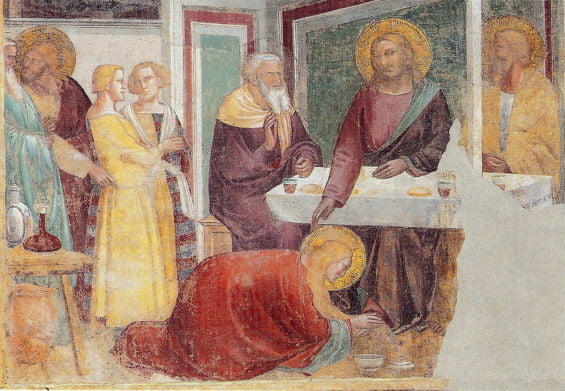An encounter with love – this is the theme I like to suggest for these days of Holy Week. Pope Francis right at the beginning of his apostolic exhortation, The Joy of the Gospel, invites us to an ‘encounter with Christ.’ He writes: “I invite all Christians, everywhere, at this very moment, to a renewed personal encounter with Jesus Christ, or at least an openness to letting him encounter them; I ask all of you to do this unfailingly each day” (p.1). This encounter with Christ is an encounter with love. And, it is an encounter initiated by God. What does it mean to be open to letting Christ encounter us? What would such an encounter feel like? What would it do to my present consciousness? Would my perceptual horizons be expanded or changed? How concretely would such an encounter impact my life? And Pope Francis is asking that we would do this “unfailingly each day”.
The two rituals at the center of the Holy Thursday liturgy tease out a sense of what this daily encounter would mean for our lives: Jesus washing the feet of his disciples and the Eucharist. An encounter with love: there is all the emotional content we bring to this word ‘love’…and this is fine…still it is so much more. God’s love is the most powerful force in our world: for it has the power to transform, the power to create change, the power to meet the force of evil and change it for the good. This encounter is not one that is controlling or dominating. Rather, it is a heart to heart encounter. God’s love, which is constitutive of this encounter, never dominates or controls. The gospels offer many examples: to the rich young man who asked Jesus what he must do to gain eternal life: ‘Jesus looked steadily at him and loved him’ and then said ‘Go and sell all you own, come, follow me’. In the encounter with the woman who was caught in adultery: ‘Has anyone condemned you woman?’ ‘No one sir.’ ‘Neither do I condemn you.’ And this to his disciples: ‘I no longer call you servants but friends.’
In the three synoptic gospels of Matthew, Mark, and Luke, Jesus’ last symbolic and literal offering of his self is the Eucharistic meal. In John’s gospel it is the washing of the feet of his disciples. In the washing of the feet what is Jesus communicating? There are layers of meaning but one I think is this: Peter initially says to Jesus, ‘no Lord you will not wash my feet’. Jesus is firm in his response back to Peter; ‘you will have no share in my inheritance’ if I do not wash your feet…Jesus bends down in loving service, this whole ritual is about an encounter of love…it is a new way of understanding an exercise of authority and service, one to another…no one is above any other person…this power of love restores dignity to each person, it opens each one to see that they are capax dei, capacity for God, capacity to become Christ-like.
In the Eucharist Jesus offers his very self totally for everyone….this self-offering, this self-gift transcends friends and enemies…it is an offering for both, friend and foe. And we disciples, rooted in Christ, we are to do the same…the force, the transforming power behind it all is the Spirit…the Spirit of Love….a love force or power that darkness can NOT overcome.
Imagine a daily encounter with God’s Word of Life, an encounter with the One who is the fullness of God’s Love. Br. Christophe writes, from his journal Born From the Gaze of God, words from his encounter with Divine Love: “Christianity is the great adventure for through it one is called by an infinite love that is, by a love that does not cease to ask and to give” (p.16). ‘Being called by infinite love’: it will indeed ask something of us, and as well it will give us something. Next, these words written just days before Br. Christophe and his brothers were kidnapped: “‘Love one another as I have loved you,’ Jesus says in the Eucharist. He unveils the positive contents of the old commandments, by filling them with Love. Only dying to myself will allow me to enter into this new dimension and commune in the work of the Cross. Abba, not what I want, but what You want” (p.209). It is true that this encounter with Divine Love stretches our boundaries, calls us always beyond our selves, beyond what we think we are able or capable of being and doing. Jesus loved to the end: this daily encounter builds up our faith, it builds up our inner strength and gives us the grace to do the same…it gives us just enough for each day ‘to walk as Jesus walked’.
These days of Holy Week bring into the foreground the face of God’s love in Christ. As we live this Holy Week together, witnessing how Jesus loved to the end, let us not shrink back in fear, and pray the grace to go beyond ourselves, to die to ourselves in order to embody this surrendered, redeeming, resurrected love.
I conclude with this journal entry from Br. Christophe. It describes an encounter where he is seeking to hold on to the non-violent love, the mercy that Jesus embodies: “Today you tell me not to resist the wicked, not on his own ground (violence, lies, hatred). On the contrary, if anyone strikes you on the right cheek, turn the other as well. Do not renounce your dignity, your highest and most vulnerable truth: your face (Lord) engages me in this battle. You stronger Love: ‘I am with you’” (p.177).


